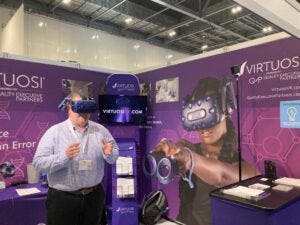
Talent shortages and training issues were identified at Advanced Therapies 2022 as one of the challenges restricting ATMPs pathway to commercialization.
The difficulty to recruit highly-skilled individuals in the advanced therapy space has been heavily documented, and companies such as Lonza, SwedenBIO, and MilliporeSigma have expressed their talent shortage concerns to this publication at different times over the past couple of years.
With its high cost and potential to affect time-to-market, it was no surprise that recruitment was at the forefront of conversations at the Advanced Therapies conference in London, UK earlier this week.

Virtuosi’s booth at Advanced Therapies, 2022.
“There is lots of excitement in the advanced therapies space [but] it is demanding and needs [someone] with a skill set,” Robin Mersh senior vice president of sales at Virtuosi told BioProcess Insider.
“There is a knee-jerk reaction to try and recruit people who are ‘ready-made.’ For example, companies will go to a location where there is a talent pool and academia and think that’ll solve the problem, however this comes with a big but as the companies will have higher competition.”
Mersh was keen to add that a pitfall for employers is “recruiting people with PHDs thinking that this will solve the problem, but they usually have to be paid a high salary, and don’t know GMP.”
Additionally, he said that the issues in industry are not just about talent shortages and the approach to recruiting, but also current training programs.
21st century training
To try and ease the bottleneck of staff shortages and time to competency, Virtuosi has designed a pharmaceutical educational product that uses virtual reality (VR) has been designed with upskilling and education as its main focus.
“Virtuosi doesn’t solve everything and there will still be a bottleneck as we cannot replace traditional methods with VR,” said Mersh. However, those who use VR training are “less paranoid as there is no potential material costs and it can reduce training time up to 33%.”
Mersh added that it is not the case that traditional training methods do not work or have purpose, but rather that the industry now has access to VR and ways of addressing different training challenges.
“Humans are the most important part of the process and also most likely to make errors [but] you can get to market faster if you can train people quicker,” said Mersh.
Virtuosi is not the sole company using VR to overcome recruitment issues. The Cell and Gene Therapy Catapult (CGT Catapult), for example, has introduced VR training across the entirety of its skills development programs to meet the demands of the industry.
About the Author
You May Also Like






